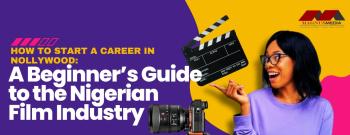5 Signs of a Good Film Director

A director plays a huge role in the production of audio-visual contents for its consumers. In reality, a director is one who transforms a script into a movie or a broadcast programme. He/she determines the creative vision of a feature film, television show, play, short film, music video or other type of audio-visual production.
Before you give out your film or script to anyone, here are 5 signs to know if the director is good or not.
1. Understand Lighting
One of the biggest stylistic differences between a small budget and a big budget production is the use of lighting. Filmmakers need to study lighting to be able to help support the mood of their story. They will need to know how to light a set using either artificial or natural light. Independent films don’t require cube vans and huge lighting kits but that doesn’t mean that filmmakers can ignore lighting altogether. Sure you won’t be able to properly light an entire city block at night, but you should be able to light your protagonist’s bedroom. In order to do this properly you need to study lighting.
2. Flexible Creativity
It’s impossible to make films without creativity, and you can’t claim to be a creative filmmaker if you haven’t invested your time in understanding the range of filmmaking specialties. As a filmmaker, whether you’re hoping to work as a director, producer, post-production coordinator, or otherwise, you need the creative talent to be able to visualize the production of a film. From start to finish, filmmaking requires vision from everyone involved in the process - everyone feeds into and off of the ideas for a film, and no matter what you hope to be specializing in as a filmmaker, you should be prepared to contribute to the creation of a film in any way that’s needed; that includes working in positions that may not be your dream job but still require you to use your creativity to contribute to a film as a whole. Magnus Film Academy is a laudable film academy in Nigeria and Africa at large poised with grooming aspiring filmmakers express themselves fully in media and entertainment – you can read more about us on www.magnusfilmacademy.com
3. Understand Design
Another stylistic issue which turns a lot of audience’s off, is the lack of design in a film. All large budget productions will hire a production designer to conceptualize the look of a film. Essentially, a film’s designer is the film’s architect. They work with the director, stylists and set decorators to help design a colour palette, incorporate texture and find outfits and props that fit into the overall design of a film.
4 Script Analysis
As discussed above, a filmmaker needs to be able to identify a good story. A good director will always be able to go through a script and look for the dramatic peaks and valleys. They should also be able to identify issues with relationships, character arcs, scene wants, acting beats, story beats and so on. Filmmakers need to study how to analyse and deconstruct a story if they plan on keeping an audience interested for 90 minutes. This is not an easy task but there are methods and strategies you can study to help increase your chances of success.
5. Written and Visual Storytelling
Although filmmakers can spend hours, months, and even years physically making a film, there’s no way to make a film – or at least a successful film – without the skills needed for both visual and written storytelling. Although not everyone is a creative genius and not everyone will be able to write the best scripts and create the best storyboards, everyone can foster the skills needed to understand, draft, evaluate and analyse stories, including written scripts and wordless visual stories. Even if you’ll have no role in writing a script or creating the artistic visuals, as a filmmaker, you will need to understand the story you’re trying to portray so that you can create a film whose story is portrayed well throughout every element of production.








